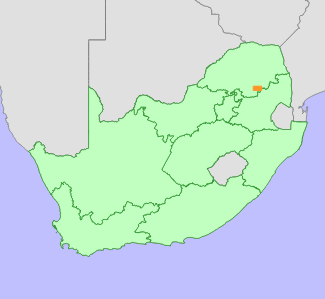|
Scientific Name | Gladiolus reginae Goldblatt & J.C.Manning |
Higher Classification | Monocotyledons |
Family | IRIDACEAE |
National Status |
Status and Criteria | Critically Endangered C1 |
Assessment Date | 2013/05/23 |
Assessor(s) | L. von Staden & W. McCleland |
Justification | A localized (EOO 17 km²) species, which is threatened by habitat loss to mining at two of its three known locations. The population numbers less than 200 mature individuals, and is projected to decline by >50% within one generation (10-15 years) due to ongoing habitat loss and degradation. |
Distribution |
Endemism | South African endemic |
Provincial distribution | Limpopo |
Range | Sekhukhuneland, Dwarsrivier and Steelpoort River valleys south of Kennedy's Vale. |
Habitat and Ecology |
Major system | Terrestrial |
Major habitats | Sekhukhune Mountain Bushveld |
Description | Dry, wooded rocky norite outcrops. |
Threats |
| Threatened by ongoing habitat loss to expanding platinum mining, as well as habitat degradation as a result of overgrazing by livestock (mainly goats), and wood collecting. |
Population |
Gladiolus reginae is an extremely localized habitat specialist, currently known from two to three subpopulations spread over three adjacent properties. Thus far, fewer than 200 mature individuals have been counted. If planned open-cast mining at two of the three locations is to go ahead, the population will be reduced by more than 50% within the next 10 years/one generation.
|
Population trend | Decreasing |
Assessment History |
Taxon assessed |
Status and Criteria |
Citation/Red List version | | Gladiolus reginae Goldblatt & J.C.Manning | CR C1 | 2014.1 | |
Bibliography |
Manning, J.C. and Goldblatt, P. 2009. Three new species of Gladiolus (Iridaceae) from South Africa, a major range extension for G. rubellus and taxonomic notes for the genus in southern and tropical Africa. Bothalia 39(1):37-45.
|
Citation |
| von Staden, L. & McCleland, W. 2013. Gladiolus reginae Goldblatt & J.C.Manning. National Assessment: Red List of South African Plants version 2024.1. Accessed on 2025/12/12 |
 Comment on this assessment
Comment on this assessment


